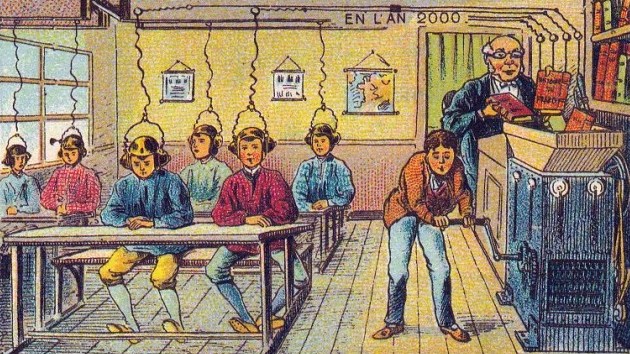“Our problem [with education] today is not to enforce conformity; it is rather that we are threatened with an excess of conformity. Our problem is to foster diversity.” –Milton Friedman, Capitalism & Freedom
 The education reform movement has set forth a range of strategies to combat the leviathan of public education. Yet more often than not, those solutions are couched only with boilerplate about the glories of markets and competition.
The education reform movement has set forth a range of strategies to combat the leviathan of public education. Yet more often than not, those solutions are couched only with boilerplate about the glories of markets and competition.
There is plenty of truth behind such rhetoric, but as Greg Forster outlines in an extensive series of articles at EdChoice, a revival in education policy and educational institutions is going to require much more than free-market talking points and surface-level solutions.
“It’s not that the things we’re saying are wrong,” he writes. “We just aren’t getting to the heart of the matter because we are not challenging our nation to re-ask itself the big questions about education: What is the purpose of education? Who has final responsibility for it and why?”
Indeed, while our aversion to technocratic solutions has prodded us to focus on things like improving accountability, expanding competition, and removing barriers to information, many of the subsequent reforms have fallen prey to the same technocratic temptations. As Forster reminds us, in education, “technocracy fails more importantly because it is based on a wrong understanding of what education is for.”
Once we ask that question — what is a good education? — we’re forced to confront the idols of conformity that truly dominate the system. It is here, Forster argues, that we find the real root of our problems in educational policy, and it is here where we ought to begin:
The majority of education reformers have gravitated toward an approach that carefully avoids the challenge of pluralism. That is technocracy—rigid and centralized systems of control, using narrow and reductive quantitative metrics that give enormous power to a special class of education experts, on the theory that we can trust them to be all-knowing, benevolent and apolitical. A technocratic spirit lies behind Common Core, obviously, but it also lay behind some earlier reform efforts such as graduation exams, merit pay for test score increases, and the 100 percent proficiency requirement in No Child Left Behind. This is clearer to me now than it was 10 years ago…
The logic of technocracy is simple: Let’s forget about the things that we strongly disagree about, and focus on the things that everyone ought to be able to reach agreement about pretty easily. As a result, technocracy effectively narrows down the agenda for the head to reading and math scores, keeps the agenda for the hands hopelessly vague (“critical thinking”) and keeps silent about the heart. What makes this so tempting is the illusion that we can avoid uncomfortable, potentially divisive questions about what is good and right.
To unearth this root, Forster continues, “the challenge of pluralistic education must be met head-on, not avoided. Educational leaders must not abdicate our responsibility to articulate a vision of the good to guide education.”
Embracing the challenge of pluralism is not going to be easy, but it’s sure to refocus our attention on the actual tensions and where exactly they begin. Instead of arguing over test scores, accessibility, parental control, achievement gaps, accountability structures, and teacher’s salaries, we can focus our attention what good education actually is.
Prior to that comes the question, “What does it mean for people to grow into their human potential?” If we ask what comes before that, we get to the really fundamental questions: “What is good? What is true? What is beautiful?”
…[H]istorically, great educational changes have not come from people with a vision about schools. They have come from people with a vision of the good, the true and the beautiful—and of human potential to achieve and appreciate those things—that had implications for schools.
Plato and Aristotle founded the classical academy not because they wanted good schools, but because they wanted to devote their lives to contemplating truth. The medieval scholastics founded the university not because they wanted schools, but because they wanted God. The progressive and pragmatist movements, which shaped today’s educational models, were also not about schools, but about a new understanding of what it means to be human.
The reasons for this are rich and varied, and the path to application and implementation is no clean street, so I encourage you to read Forster’s more detailed essays on the principles and practicals (intro, parts 1, 2, and 3).
It’s a needed shift in our cultural imaginations, and it’s sure to influence our debates on policy and institutional formation as we pursue educational reforms, whether in our local communities or at a national level. There’s sure to be plenty of disagreement, and the solutions of a pluralistic society are sure to include even more, but we needn’t allow the inevitable tensions to undermine our efforts.
“It is in education where our public policy must have the strongest moral commitment to freedom and diversity if we want to sustain a society characterized by freedom and diversity,” writes Forster. “The challenge of pluralism is also an opportunity for us to discover a fresh vision of human potential that embraces the freedom to disagree about the highest things.”

